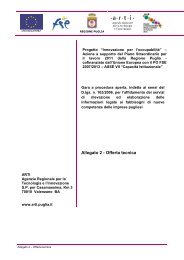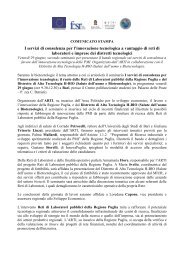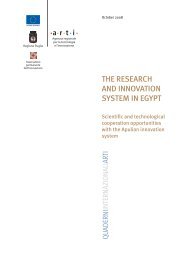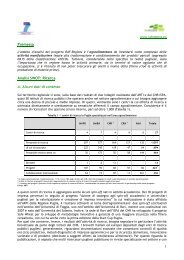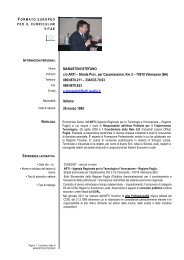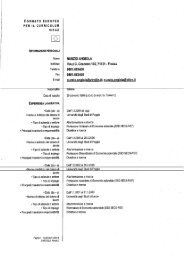ARTI Egitto definitivo - ARTI Puglia
ARTI Egitto definitivo - ARTI Puglia
ARTI Egitto definitivo - ARTI Puglia
Create successful ePaper yourself
Turn your PDF publications into a flip-book with our unique Google optimized e-Paper software.
Private Equity has not been widely used in Egypt in the past as a source of funding for<br />
businesses. The government, however, has instituted a number of policy changes and<br />
reforms specifically intended to develop internal private equity funds and to attract private<br />
equity funding from international sources.<br />
The major industries include textiles, hydrocarbon and chemical production, and generic<br />
pharmaceutical production. Unemployment is high at about 10 %.<br />
Major fiscal reforms were introduced in 2005 in order to tackle the informal sector which<br />
according to estimates represents somewhere between 30% to 60% of GDP. Significant tax<br />
cuts for corporations were introduced for the first time in Egyptian history. The new Income<br />
tax Law No 91 for 2005 reduced the tax rate from 40% to 20%. According to government<br />
figures, tax filing by individuals and corporations increased by 100%.<br />
Many changes were made to cut trade tariffs. Among the legislator’s goals were tackling the<br />
black market, reducing bureaucracy and pushing through trade liberalization measures.<br />
Amendments to Investment and Company law were introduced in order to attract foreign<br />
investors. For example, the number of days required for establishing a company was<br />
dramatically reduced.<br />
Significant improvement to the domestic economic environment increased investors’<br />
confidence in Egypt. The Cairo & Alexandria Stock Exchange is considered among the best<br />
ten emerging markets in the world. The changes to the policy also attracted increased<br />
levels of foreign direct investment in Egypt. According to the UN Conference on Trade and<br />
Development’s World Investment Report, Egypt was ranked the second largest country in<br />
attracting foreign investment in Africa.<br />
Given the large number of amendments to laws and regulations, Egypt has succeeded to a<br />
certain extent in conforming to international standards. Very recently the Cairo &<br />
Alexandria Stock Exchange (CASE) was welcomed with full membership into the World<br />
Federation of Exchanges (WFE)—the first Arab country to be invited.<br />
In April 2008, The IFC — the private sector arm of the World Bank Group — signed a<br />
memorandum of understanding with Egypt’s Industrial Development Agency (IDA) that<br />
seeks to streamline and decentralize the process of obtaining industrial licenses, reducing<br />
cost and time needed to register a company. Over the next two years, the project will help<br />
create an integrated platform for business start-up procedures at the national level.<br />
Managed by the IFC, the project will involve the government as well as the private sector in<br />
identifying issues that hinder processes for obtaining licenses and permits. IFC will<br />
introduce international best practices, replicate pilot reforms at the municipal level, and<br />
streamline approval procedures required by public entities.<br />
1.11. Challenges<br />
The development of the Egyptian economy is facing some challenges which must be dealt<br />
with. Some of these challenges are :<br />
22<br />
THE RESEARCH AND INNOVATION SYSTEM IN EGYPT







